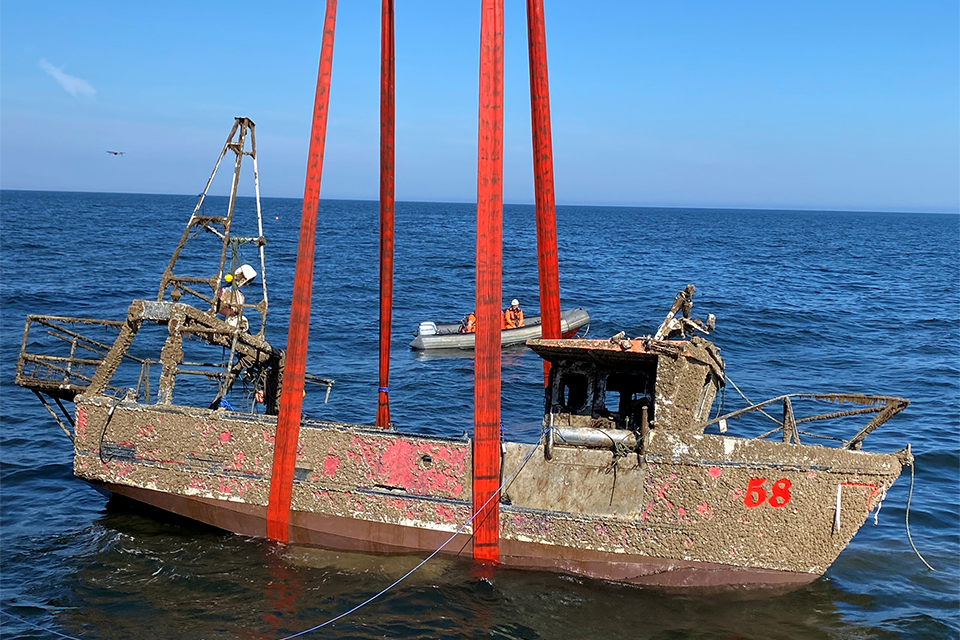Safety flyer to the fishing industry - Nicola Faith
Published 23 June 2022
1. Summary
Foundering of the whelk potter Nicola Faith (BS58), resulting in the loss of all three crew, in Colwyn Bay, North Wales, on 27 January 2021

Nicola Faith
2. Narrative
On the 27 January 2021, the 9.81m whelk potter Nicola Faith was fishing about 2-3 miles offshore and relocating whelk pots. Loaded with a day’s catch and four strings of pots (approximately 240 in total) to be relocated, the vessel capsized and foundered with the loss of all three of its crew.
The vessel was not equipped with an Emergency Position Indicating Radio Beacon (EPIRB) nor were the crew wearing personal locator beacons (PLBs). The absence of this mandatory safety equipment meant the alarm was not raised for some 16 hours after the foundering, and the subsequent search and rescue operation found no trace of Nicola Faith or its crew.
The MAIB investigation found that the boat had undergone extensive modifications in the 2 years before the accident, none of which had been approved by the Maritime and Coastguard Agency (MCA). The modifications had eroded its stability safety margin and this meant that, when combined with an estimated 2090kg of catch plus a weighed 2521kg of fishing gear on board at the time of the accident, the vessel had a very small amount of positive stability. The working deck was cluttered and partially covered by a canopy made from steel tubes and plywood sheets. The vessel capsized quickly; this is likely to have trapped the crew on board and they were probably taken down with the vessel when it sank.
3. Safety Lessons
-
When Nicola Faith was built it had adequate stability for its designed purpose. The unauthorised modifications carried out to the vessel severely compromised its stability. Thought must be given to how planned modifications will affect a vessel’s stability and may involve the services of a naval architect to accurately calculate what effect the additions or changes to the vessel will have on the stability safety margin. Additionally, permission must be sought from the MCA before any significant modifications are undertaken.
-
Skippers should have a good understanding of their vessel’s underlying stability and how this can change during fishing operations. Simple roll tests, heel tests, or a Wolfson assessment will provide skippers with the basic information. Loading a vessel heavily with catch, and then adding retrieved fishing gear, can quickly render a vessel unstable.
-
EPIRBs and/or PLBs are mandatory safety equipment for very good reason. Their purpose, to transmit the location of an incident and thereby focus any search and rescue effort, undoubtedly saves lives. A personal flotation device (PFD) can keep a casualty afloat sufficiently long enough for the rescue services, or their own vessel, to find them.
Our accident investigation report is available at: https://www.gov.uk/maib-reports/capsize-and-sinking-of-whelk-potter-nicola-faith-with-loss-of-3-lives.
Extract from The United Kingdom Merchant Shipping (Accident Reporting and Investigation) Regulations 2012 – Regulation 5:
The sole objective of the investigation of an accident under the Merchant Shipping (Accident Reporting and Investigation) Regulations 2012 shall be the prevention of future accidents through the ascertainment of its causes and circumstances. It shall not be the purpose of an such investigation to determine liability nor, except so far as is necessary to achieve its objective, to apportion blame.
Note:
This safety flyer is not written with litigation in mind and, pursuant to Regulation 14(14) of the Merchant Shipping (Accident Reporting and Investigation) Regulations 2012, shall be inadmissible in any judicial proceedings whose purpose, or one of whose purposes is to attribute or apportion liability or blame.
Marine Accident Investigation Branch
First Floor, Spring Place
105 Commercial Road
Southampton
SO15 1GH
Email [email protected]
Enquiries during office hours +44 (0)23 8039 5500

